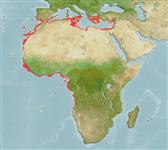Classification / Names
Common names from other countries
Main reference
Size / Weight / Age
Max length : 120 cm TL male/unsexed; (Ref. 5222); common length : 60.0 cm TL male/unsexed; (Ref. 26999); max. published weight: 25.0 kg (Ref. 5222)
Length at first maturity
Lm ?, range 50 - 60 cm
Environment
Marine; brackish; demersal; oceanodromous (Ref. 51243); depth range 20 - 200 m (Ref. 3589)
Climate / Range
Subtropical, preferred 27°C (Ref. 107945); 39°N - 16°S, 17°W - 60°E (Ref. 54435)
Distribution
Short description
Dorsal
spines
(total): 10 - 11;
Dorsal
soft rays
(total): 14-16;
Anal
spines: 3;
Anal
soft rays: 7 - 9. Diagnosis: depth of body less than head length, depth 3.0-3.6 times in SL; head length 2.5-2.9 times in SL; interorbital area convex; preopercle angular, 3.6- large spines at the angle, lowermost directed ventrally; posterior nostril slightly bigger than anterior nostril; maxilla reaches nearly to vertical at rear edge of eye; pelvic fin origin below base of pectoral fins; rounded caudal fin; body scales ctenoid (Ref. 89707).
IUCN Red List Status (Ref. 115185)
Threat to humans
Harmless
Human uses
Fisheries: commercial; aquaculture: experimental; gamefish: yes
More information
ReferencesAquacultureAquaculture profileStrainsGeneticsAllele frequenciesHeritabilityDiseasesProcessingMass conversion
Tools
Special reports
Download XML
Internet sources
Estimates of some properties based on models
Phylogenetic diversity index
PD50 = 0.5000 many relatives (e.g. carps) 0.5 - 2.0 few relatives (e.g. lungfishes)
Trophic Level
4.0 ±0.59 se; Based on food items.
Resilience
Medium, minimum population doubling time 1.4 - 4.4 years (K=0.15-0.25; tm=5-7; tmax=17; Fec>1 million)
Vulnerability
Moderate to high vulnerability (52 of 100)
Price category
